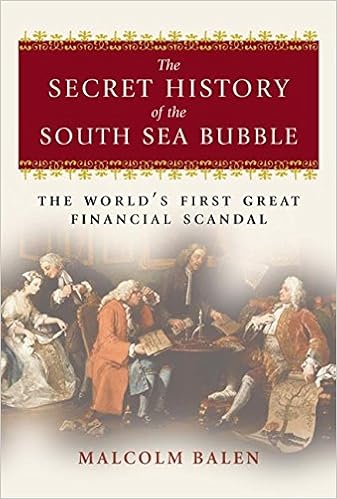The South Sea Bubble: An Economic History of its Origins and Consequences. (Routledge Explorations i
Contents:
Cite this Email this Add to favourites Print this page. Catalogue Persistent Identifier https: You must be logged in to Tag Records.
In the Library Request this item to view in the Library's reading rooms using your library card. YY hbk Main Reading Room. Order a copy Copyright or permission restrictions may apply. We will contact you if necessary. To learn more about Copies Direct watch this short online video. How do I find a book? Can I borrow this item? Can I get a copy?
Find a copy in the library
Can I view this online? The South Sea bubble: Members of Aboriginal, Torres Strait Islander and Maori communities are advised that this catalogue contains names and images of deceased people.
As Helen Paul argues in the introduction to this book, the South Sea Bubble has become a byword for human folly. Despite the passing of nearly three hundred years, it is still cited by journalists seeking examples to prove the ubiquity of irrationality and fraud in financial markets.
Popular histories of the Bubble too, present a world momentarily driven mad by the possibilities and disappointments of speculation.
The South Sea Bubble: An Economic History of Its Origins and Consequences
Perhaps in reaction to this characterization, when economists and economic historians consider the Bubble, they often view it a test case for the efficiency, or otherwise, of early modern financial markets. The consequence has been that the real history of the South Sea Company and the scheme of has disappeared behind disagreements about the nature of bubbles, how they blow up, why they burst and whether they can ever be judged as rational.
Paul, a fellow in economics at the University of Southampton, offers an explanation for the Bubble that does not rely upon the assumption that everyone in had lost their wits.
- Hay Fever Relief.
- Constructing Place: Mind and the Matter of Place-Making.
- .
- Fatal Error.
- Everything You Always Wanted to Know About Ex*.
In doing so she also attempts to rescue the history of the South Sea Company from its distracting association with the Bubble. A wide variety of sources, rather than just stock ledgers and price data, are employed to place the Bubble in broader economic and social contexts and, in particular, to help the reader understand the purpose and strengths of the South Sea Company, both before and until its dissolution in All this is done in a style which, although employing economic theory and making use of quantitative methods, remains accessible and appealing to an audience of economists and non-economists alike.

Following an introduction which explains both the historiographical and theoretical backgrounds to the Bubble debate, Paul goes on to provide a thematic account of the rise of the financial market in London, the development of the South Sea Company and the contexts and consequences of the Bubble. The early chapters provide a history of the stock market in early modern England, discuss the development of the national debt and explain the reasons for the establishment of the South Sea Company.
Paul emphasizes that the Company, the scheme of and the blowing up and bursting of the Bubble were just one part of the broader development of the British financial system. She also explains the origins of the mistrust of finance and financiers and makes the particularly useful and oft-forgotten point that most financial innovation during this period was deeply criticized. The South Sea Company, in other words, was not alone in attracting the disapproval of contemporaries.
The South Sea Bubble : an economic history of its origins and consequences
Chapter 6 is key to Paul? It explains the reasons why investors might have chosen to commit their funds to the South Sea Company.
Despite the passing of nearly three hundred years, it is still cited by journalists seeking examples to prove the ubiquity of irrationality and fraud in financial markets. Members of Aboriginal, Torres Strait Islander and Maori communities are advised that this catalogue contains names and images of deceased people. A wide variety of sources, rather than just stock ledgers and price data, are employed to place the Bubble in broader economic and social contexts and, in particular, to help the reader understand the purpose and strengths of the South Sea Company, both before and until its dissolution in Book , Online - Google Books. Net reviews are archived at http:
And this is indeed an important point. The Company was not established solely for the fraudulent management of government debt, nor was its only focus on conning the na? The South Sea Company did engage in trade, both slaving and later, whaling.
- Directory of Sports Talk Radio Shows.
- ?
- Creative Wildfire: An Introduction to Art Journaling - Basics and Beyond.
- Bull Soldiers (The Drakenheim Chronicles)?
- Historical Exklusiv Band 21: Der Meisterdieb / Auf verbotenen Wegen / (German Edition).
- .
- .
Paul makes the point that, given this knowledge, those who invested in the Company might have had sound reasons for doing so. Moreover, in addition to its trading activities, the South Sea Company? The Bank of England had already grown rich and secure from just such connections with the state.
It might also be argued that there were some fine business minds among the Company?